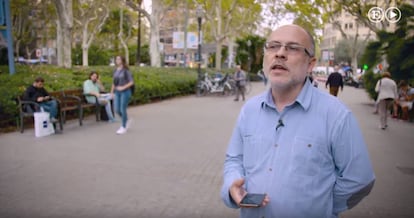Parents’ groups call for “pajama parties” to keep schools open for Catalan vote
Associations hope activities will ensure voting centers are not shut down for the independence referendum

Parents’ associations in Catalonia have taken the initiative to keep schools open from today until Sunday, with the aim of letting them be used as polling stations for the illegal referendum on independence to be held in the region on October 1. These associations have announced camp-outs and “pajama parties” for schools over the weekend to circumvent the Catalan High Court, which has ordered the closure of authorized poll places.

At the Bages School in the Catalan city of Manresa, the parents’ association has organized a “back to school” party with activities throughout the weekend, camping included, on school premises. The Pedra Blanca School in Girona, has also prepared cultural and social events for this weekend, where families are invited to a “pajama party” with children on Friday and Saturday nights. At the Encants School in Barcelona, a father was handing out fliers at the gates, calling for the occupation of the school via the “holding of family leisure days throughout the weekend.”
The only thing we have asked of associations is that they act in the defense of democratic rights Alex Castillo, spokesman for FAPAC
Spokesperson for the Federation of Parents’ Associations in Catalonia (FAPAC), Alex Castillo, said on Thursday that the act of keeping schools open this weekend was “significantly important,” although he did not specify how many schools were involved.
FAPAC represents 76% of Catalan parents’ associations. Castillo said the federation would “respect” all the parents associations’ decisions, whether that means opening schools or not. “The only thing we have asked of associations is that they act in defense of democratic rights,” he said.
The Catalan regional High Court has ordered the sealing of the centers designated as polling stations to block the illegal referendum from going ahead. Faced with the possibility of a police intervention to evict people from these centers, Castillo was blunt: “To say that children are being used as human shields is ridiculous. Children are not at risk because we trust in people’s judgment to assess when there are risks,” he said.
School principals concerned
Despite the parent associations’ initiatives to circumvent judicial instructions, school principal remain uncertain. As the central government has warned them, they are responsible for what happens in their education centers.
“Be free from that responsibility. It is me and my ministers who are responsible for making sure we reach the finish line,” said Catalan regional premier Carles Puigdemont yesterday.
Puigdemont’s words, however, have not convinced some unions and the association of school directors (Axia). “We are defenseless. Everything needs to follow protocol. If a parents’ association wants to hold activities in the school, the directors have to authorize it and sign a form,” explained Axia president Isabel Sánchez.
School principals want the regional government to assume “de facto responsibility” for using the schools as polling stations
Axia is demanding that the regional government assume “de facto responsibility” and has urged regional education chief Clara Ponsatí to temporarily remove all principals from their roles and take over the leadership of the schools.
The regional government sent a letter to the directors last Wednesday exempting them of any responsibility, but that is not enough for the unions and Axia. “That letter is only a statement of intent. It does not help us,” says Manuel Pulido, with the CCOO general workers union. A spokesperson for the regional government said they had already done all they could to reassure school principals.
English version by Debora Almeida.
Tu suscripción se está usando en otro dispositivo
¿Quieres añadir otro usuario a tu suscripción?
Si continúas leyendo en este dispositivo, no se podrá leer en el otro.
FlechaTu suscripción se está usando en otro dispositivo y solo puedes acceder a EL PAÍS desde un dispositivo a la vez.
Si quieres compartir tu cuenta, cambia tu suscripción a la modalidad Premium, así podrás añadir otro usuario. Cada uno accederá con su propia cuenta de email, lo que os permitirá personalizar vuestra experiencia en EL PAÍS.
¿Tienes una suscripción de empresa? Accede aquí para contratar más cuentas.
En el caso de no saber quién está usando tu cuenta, te recomendamos cambiar tu contraseña aquí.
Si decides continuar compartiendo tu cuenta, este mensaje se mostrará en tu dispositivo y en el de la otra persona que está usando tu cuenta de forma indefinida, afectando a tu experiencia de lectura. Puedes consultar aquí los términos y condiciones de la suscripción digital.








































